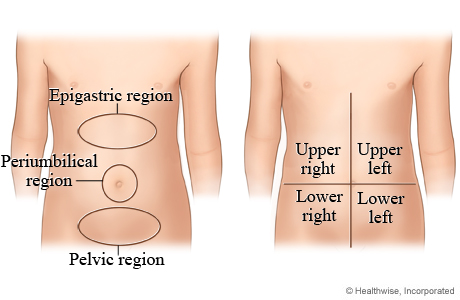Abdominal Pain in Children

Generalized pain occurs in two or more sections of the abdomen.
Localized pain is confined to or is most intense in one section of the abdomen. Localized pain that comes on suddenly and gets steadily worse may mean a problem with an underlying organ. A serious problem may be present if other symptoms, such as diarrhea, nausea, vomiting, or fever, develop after the abdominal pain started. Localized pain is also more worrisome if the pain starts in more than one area of the abdomen (generalized) and then becomes localized.
How can you care for your child's abdominal pain?
- Make sure your child rests.
- Give your child lots of fluids a little at a time. This is very important if your child is vomiting or has diarrhea. Give your child sips of water or drinks such as Pedialyte or Infalyte. These drinks contain a mix of salt, sugar, and minerals. You can buy them at drugstores or grocery stores. Give these drinks as long as your child is throwing up or has diarrhea. Do not use them as the only source of liquids or food for more than 12 to 24 hours.
- Start to offer small amounts of food when your child feels like eating.
- Have your child take medicines exactly as directed. Call your doctor if you think your child is having a problem with a medicine.
- Do not give your child aspirin, ibuprofen (Advil, Motrin), or naproxen (Aleve). These can cause stomach upset.
Abdominal pain: When to call
Call 911 anytime you think you may need emergency care. For example, call if:
- You passed out (lost consciousness).
- You pass maroon or very bloody stools.
- You vomit blood or what looks like coffee grounds.
- You have severe belly pain.
Call your doctor now or seek immediate medical care if:
- Your pain gets worse, especially if it becomes focused in one area of your belly.
- You have a new or higher fever.
- Your stools are black and look like tar, or they have streaks of blood.
- You have unexpected vaginal bleeding.
- You have symptoms of a urinary tract infection. These may include:
- Pain when you urinate.
- Urinating more often than usual.
- Blood in your urine.
- You are dizzy or lightheaded, or you feel like you may faint.
Watch closely for changes in your health, and be sure to contact your doctor if:
- You are not getting better as expected.
©2011-2026 Healthwise, Incorporated
